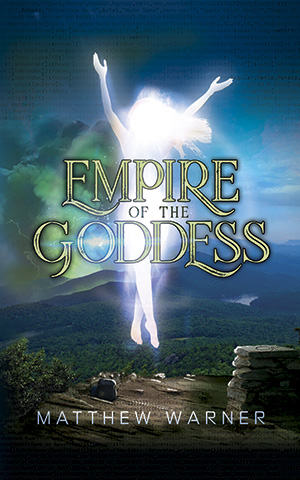All this week, I’m highlighting interesting things about Empire of the Goddess. Check out the new editions.
There’s rarely a single source of inspiration for any story I write. Empire of the Goddess had three: parasites, religious myth, and my sons.
One day, as I raised my invisible antennae to detect inspiration, I took a long walk around the neighborhood. My part of Staunton, Virginia, resembles the DC suburb I grew up in, with its single-family homes and trees. In the middle of the work day, with folks away at their jobs, it can feel like a ghost town. The familiar becomes quiet and sinister. I noticed odd details that I dutifully dictated into my handheld voice recorder. A squawking bird flew by with strange, mechanical motions. A puddle in a rain gutter concealed a bottomless pit. But what really caught my attention was the empty lot at the end of the street.
Beyond a gravelly area that marked a future road extension, a line of woods opened into another world. The trees formed a corridor into a forest of unnatural overgrowth. It felt like peering down the maw of some planetary vampire, sucking life out of the world. What if one of my boys, then aged 3 and 5, were lured into that throat? I would have to go after them.
From that visceral feeling came my main character, Thomas Dylan, whose young son, Walter, is abducted through a portal to parallel world — a world that feeds off ours.
But what kind of planet would do that? What kind of society would steal our children?
At the time, I was reading Reza Aslan’s terrific book, Zealot: The Life and Times of Jesus of Nazareth. Aslan describes a first-century Palestine teeming with itinerant holy men performing faith healings and exorcisms. They sometimes called themselves messiahs and made resistance to the Roman Empire a religious duty. In such a time, to preach about an empire of god rather than man was a capital offense.
I reasoned that a fantasy world structured similarly would seek to keep its populace under an iron fist of control. With disease and sin entwined caduceus-like in meaning, a theocratic imperium would ensure it alone dispensed healing and its deity’s forgiveness. Imagining the most dramatic mechanism I could for such oppression, I followed this garden path of thought back to the forested portal at the end of my street.
Why would this parallel world want to kidnap people from ours, casting a net into which Thomas Dylan’s son falls? The answer: to sacrifice him as part of a long-running parasitism on our world by a state religion and political power dating back to Columbus.
Make that world a dystopian version of contemporary America, set rules that allow for actual magic, and mix in some romance and Brazilian jiu-jitsu, and Thomas Dylan is off on the most transformative adventure of his life.
Perhaps some part of you will feel the same.

